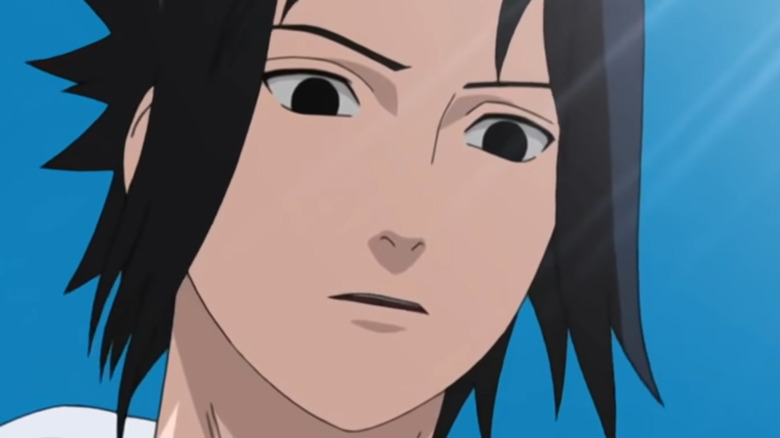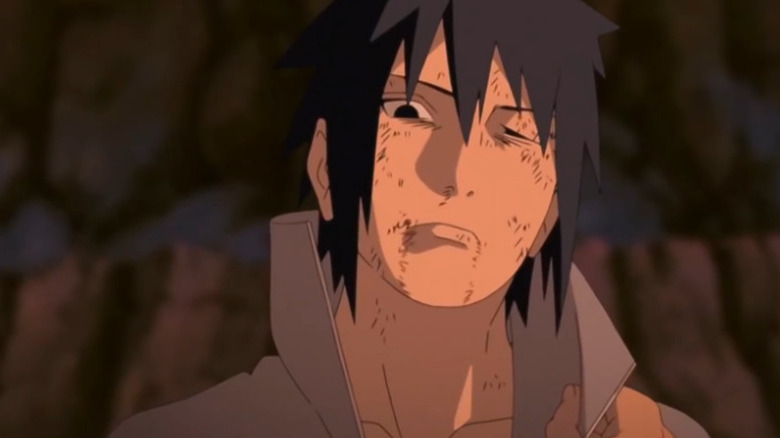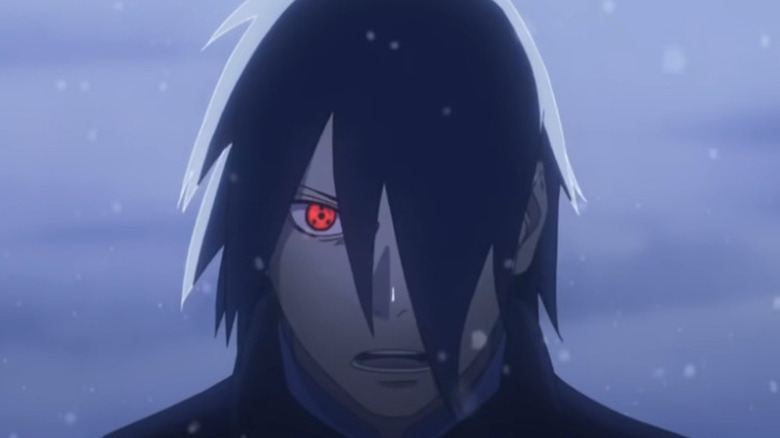Masashi Kishimoto Defends Sasuke's Descent Into Villainy In Naruto
One of the unspoken rules of any Shonen anime is that the protagonist has to have a worthy rival. And in Masashi Kishimoto's "Naruto," the titular hero received one in the form of Konoha's last remaining Uchiha. Sasuke Uchiha starts the series as the calm and collected genius student that girls in the village fawn over and boys want to become. He's the perfect foil to our boisterous orange-clad protagonist. But after their first major clash, Sasuke departs Konoha, and Kishimoto places him on a path toward evil.
Once considered Konoha's most promising ninja, Sasuke goes rogue and joins up with the village's greatest threat, Orochimaru. And that's just the start of this massive villain iceberg. By the time he and Naruto have their final battle at the end of "Shippuden," Sasuke has already racked up so many attempted murders of former comrades that we're still shocked he's back on the side of good currently in "Boruto: Naruto Next Generations." During his bad guy era, Sasuke was willing to do anything and harm anyone just for personal revenge. He was unrecognizable. And although his descent into villainy in Naruto may have been a headscratcher for some fans, creator Masashi Kishimoto actually provided a good reason for the rival's deep fall.
Sasuke's descent served as an essential lesson for Naruto
One of the most critical moments for Naruto in "Shippuden" is his meeting with Nagato during the "Pain Arc." With his village destroyed, and mentor Jiraya killed by Nagato, Naruto would be justified in taking revenge. However, the hero ultimately decides against it as he declares that he will achieve peace by ending the cycle of revenge that often plagues their world. His notion against retaliation is the opposite of Sasuke, who, at this point, is waist-deep in a vengeance-fueled journey. According to mangaka Masashi Kishimoto, Naruto's reflection on Sasuke's thirst for revenge inspired the protagonist's resolve.
In a fan-translated interview with Kana, Kishimoto noted that although Naruto had experienced the type of heartbreaking loss of a loved one that hit Sasuke, his rival's consumption of hatred is what taught the hero that he must strive to break any cycle of revenge. "That's his true performance as the hero: He survives pain & loss without abandoning himself to vengeance and hatred, realizing the difference between self-interest and public interest," Kishimoto said to Kana.
Without Sasuke's descent into villainy, Naruto would have never seen firsthand how much revenge can twist a person. However, if it all seems a little unrealistic, Kishimoto would also agree. As he also noted in the same interview, the concept of revenge in real life isn't as simple as depicted in the pages of a Shonen manga. Then again, we don't see too many ninjas summoning giant toads to stand upon, either.
Kishimoto's pirate rival once acknowledged him
The fact that Sasuke's villainy helped bolster Naruto's goal of peace above revenge is one of many examples of why the two characters perform as the greatest rivals. A rival can serve many purposes, including being a foil and challenging a character's personal philosophies. But in many cases, rivals are the ones that drive one to give it their absolute best. Masashi Kishimoto told Kana that Naruto and Sasuke couldn't exist without each other. The same could probably be said of "Naruto" and "One Piece" within "Shonen Jump." Since the two manga debuted close to each other, they often battled for the top spot within "Shonen Jump." As a result, Kishimoto once considered "One Piece" mangaka Eiichiro Oda as his rival.
Via Anime News Network, during an old panel for New York Comic Con, Kishimoto said that he initially believed in their rivalry before Oda eventually acknowledged him. "Honestly, it's interesting because I was just saying that on my own in the beginning, and then finally, in the back of Naruto Volume 72, Oda-sensei acknowledged that he considers me his rival as well," Kishimoto said during the comic con panel. "That felt so gratifying." Clearly, Kishimoto and Oda's rivalry only helped "Naruto" and "One Piece" achieve their massive successes.


